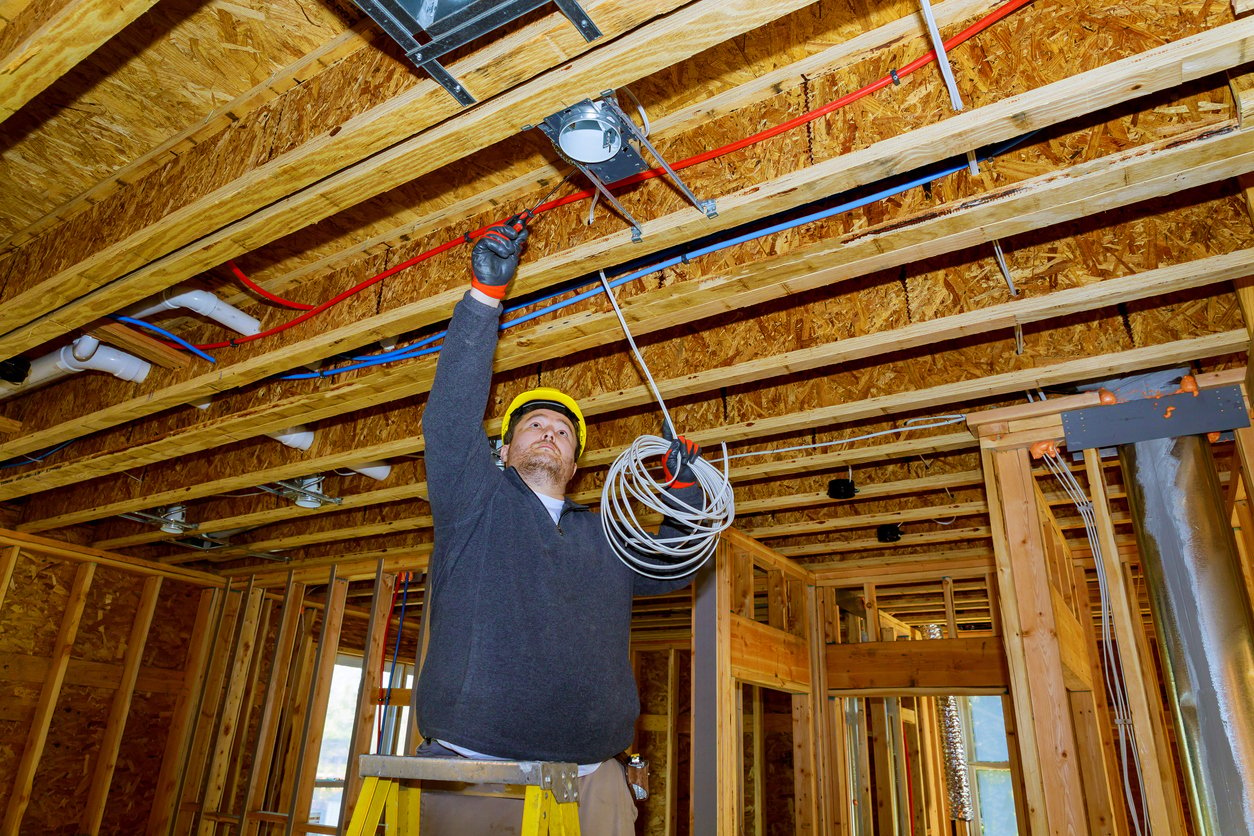Updated December 2025
Construction electricians are the skilled tradespeople who get the lights on and the machines running. They plan, install, upgrade, maintain, and repair the electrical systems that bring heat, light, communication, and power to all kinds of new buildings.
Thinking about becoming a construction electrician? Curious about what you'd actually do at work?
In this post, we break down the most typical day-to-day tasks of construction electricians. We also spoke with an experienced Hamilton-based construction electrician to get his take on the career.
Find out what to expect and see if this trade is a good choice for you.
1. READING BLUEPRINTS
When you're working on a new build or renovation, the first step is reviewing the electrical blueprints to see where circuits and panel boards will be placed.
The blueprints should also specify the location of elements like:
☑️ Outlets
☑️ Light fixtures
☑️ Internet, phone, and TV connections
☑️ Smoke detectors
☑️ Security sensors and cameras
☑️ Heating and cooling system controls
You need to understand how the power will be distributed and how each circuit will flow.
You're also responsible for seeing if the blueprints meet all applicable building codes (which you can learn about in a good electrician course).
If something doesn't look right, you need to make changes to ensure that any wiring you install is up to code.
2. Coordinating with other tradespeople
When a new building or renovation is coming together, electricians are rarely the only tradespeople on site. There are many professionals coming and going, so you need to work well with others.
Hamilton-based construction electrician Jon Kerr says this is a key part of the job.
"I regularly interact with plumbers, concrete professionals, pipe fitters, welders, general laborers, and project managers.
I work with people from all backgrounds and walks of life, many of whom speak different languages.
Plus, I have to coordinate with management and inspectors. Communication is key for electricians. You need to be able to talk and write professionally."
3. FOLLOWING ALL SAFETY PROTOCOLS
There are serious risks involved in working with electricity. Safety must be your number one priority.
That means wearing the appropriate protective gear, like insulated gloves, safety goggles, and flame-retardant clothing.
Also, you should always have a look around the work site to identify any potential hazards before you get started.
Jon Kerr says he's always thinking about safety, every day and on every job.
"You need to be sure you're doing things correctly and safely—or someone could get really hurt, or die. I'll never forget the first really bad shock I got, just from being a bit careless. I won't make that mistake again."
4. INSTALLING CONDUIT
Installing conduit is a typical daily task for most construction electricians.
Conduits are tubes or pipes that electrical wires are run through. Using a conduit provides a route for the wiring and shields it from damage.
You need to plan out the path of the conduit, measure the amount needed, and cut as required. You may need to use a conduit bender to form the pipe into the proper angle.
To finish off, you would attach conduit fittings to the wall with screws or straps and then pull the wires through.
5. INSTALLING WIRING, EQUIPMENT & FIXTURES
Once the wires are in place, you must connect them to switches, outlets, circuit breakers, fuse boxes, or transformers.
Construction electricians install light fixtures, smoke alarms, doorbells, kitchen circuitry, washer and dryer receptacles, and more.
Jon says you must have a solid grasp of math to get the job done.
"You need decent math skills, like algebra, physics, and calculus.
Electricians use math skills every day to figure out things like load calculations, circuit analysis, what size panel you need, what size transformer you need, etc.
I really struggled with math in high school. But with practice, I was able to learn the concepts needed to become an electrician. It's all about repetition."
6. Solving problems
Even the best-planned projects rarely go off without a hitch. There's always an unexpected challenge to overcome.
Construction electricians have to solve problems on a daily basis, so you need patience and good analytical skills to do this job well.
Jon says solving problems is actually a pro for him because it keeps things fresh and interesting.
"For me, dealing with challenges is one of the best parts of the job. Thinking on the fly, working to meet deadlines, and getting creative to solve new kinds of problems—every job is different, so you have to improvise, adapt and overcome.
Plus, safety standards and electrical codes are always evolving, and you have to stay on top of those. I'm always learning something new. This is what keeps things interesting for me."
7. TESTING your work
The final task is making sure the entire electrical system works the way it should.
When the installation is complete, you need to turn on the lights and test all the power. If a circuit doesn't work, you must figure out what the problem is and fix it right away.
As an apprentice working toward certification, you'd have a supervisor (licensed electrician) checking your work to ensure everything is done right.
It takes about five years to complete the training and apprenticeship required to become a construction electrician. During that time, you'll have the opportunity to learn from experienced professionals and gain confidence in your skills.
LEARN MORE ABOUT BECOMING A CONSTRUCTION ELECTRICIAN
For most people, the first step is to complete pre-apprenticeship electrician training.
This training teaches you basic skills you'll need to get hired as an apprentice - like installing wiring and fixtures, safety procedures, codes, and blueprints.
The electrician pre-apprenticeship program at Herzing College is available in Ottawa, Toronto, and Cambridge and takes just 24 weeks to complete. Our graduates get hired by construction companies and electrical contractors throughout Ontario.
Click below to check out the program and chat live with an admissions advisor. We're here to help!






